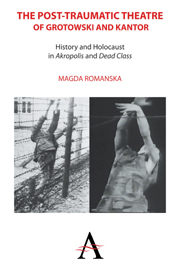 The Post-traumatic Theatre of Grotowski and Kantor
The Post-traumatic Theatre of Grotowski and Kantor from Part I - Our Auschwitz: Grotowski's Akropolis
Borowski is often considered one of the most tragic figures in Poland's Columbus 20 generation. In Miłosz's book-length essay The Captive Mind, Borowski is presented as one of the “captive” types. Borowski is Beta, the unhappy lover who survives Auschwitz and becomes zealously entangled in the Soviet regime, believing wholeheartedly that it is the only way to protect humanity from fascism. Disappointed and disillusioned, realizing he has become a part of the regime he sought to fight, Beta takes his own life. Like Beta, Borowski survived Auschwitz and eventually reunited with his fiancee Maria, who survived the women's camp. During their stay at Auschwitz, Maria was seriously ill and Borowski repeatedly risked his own life to smuggle medicine, food, and his letters to her. After the war, Borowski stayed at various prisoner camps, searching for Maria. He eventually found her in a Swedish hospital and they both returned to Poland. This was the time when Soviets began using the fear of fascism as their primary propaganda tactic, and Borowski, like many intellectuals who survived the war, came to sympathize with the Soviet regime. His former colleagues instantly accused him of betrayal and, once his stories were published, of distorting the reality of camp life and writing “amoral” prose.
To save this book to your Kindle, first ensure [email protected] is added to your Approved Personal Document E-mail List under your Personal Document Settings on the Manage Your Content and Devices page of your Amazon account. Then enter the ‘name’ part of your Kindle email address below. Find out more about saving to your Kindle.
Note you can select to save to either the @free.kindle.com or @kindle.com variations. ‘@free.kindle.com’ emails are free but can only be saved to your device when it is connected to wi-fi. ‘@kindle.com’ emails can be delivered even when you are not connected to wi-fi, but note that service fees apply.
Find out more about the Kindle Personal Document Service.
To save content items to your account, please confirm that you agree to abide by our usage policies. If this is the first time you use this feature, you will be asked to authorise Cambridge Core to connect with your account. Find out more about saving content to Dropbox.
To save content items to your account, please confirm that you agree to abide by our usage policies. If this is the first time you use this feature, you will be asked to authorise Cambridge Core to connect with your account. Find out more about saving content to Google Drive.